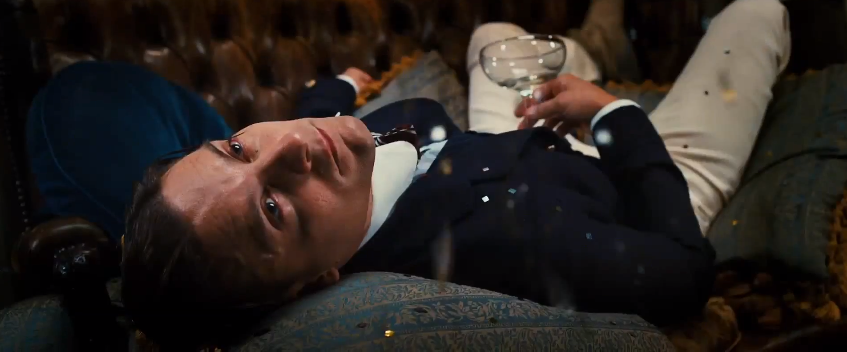
“I miss Spider-man…”
Looking past Jay-Z’s eccentric soundtrack and the gaudy staging, Baz Luhrmann’s The Great Gatsby is not a very good adaptation. Its bloated ending comes on the heels of a poorly-paced script, co-written by Luhrmann and Craig Pearce, and with the exception of Leonardo DiCaprio’s title role, the supporting cast is too hammy and melodramatic, like a series of bad Katherine Hepburn impressions. Not to mention Tobey Maguire, as bond salesman and Gatsby neighbor Nick Carraway, lends nothing to a slim role that does little more than serve as an audience surrogate. Maguire’s performance is dull and uninspired, yet Luhrmann affords him plenty of screentime, affording us additional time as well, namely to ask an important question: why do novel adaptations fail as films?
As in F. Scott Fitzgerald’s iconic novel, Luhrmann’s Carraway narrates the story, force-feeding information about Gatsby’s reclusiveness, about Daisy’s capricious fragility and her husband Tom’s steaming egotism. None of these characterizations are particularly inaccurate, but one wonders if Luhrmann could have given his actors some breathing room and done away with Carraway’s “tell not show” narration.
And it’s the narration that truly deflates Gatsby. Pearce and Luhrmann’s script begins and ends with Nick’s narration — Maguire is inexplicably a recovering alcoholic here, writing his memoirs in a sanitarium — and true to its director’s visual grandiosity, Gatsby literally projects Fitzgerald’s text on screen in the form of Nick’s written recollections of course. Like the film’s lazy characterizations, Maguire’s Nick Carraway functions less as a person and more as a reminder that yeah, The Great Gatsby was totally a book first.
So why adapt a story only to remind the audience it could be reading instead? The problem recalls Ang Lee’s Life of Pi, a film Maguire was coincidentally slated to also star in as, once again, the audience surrogate. Negotiations for the role eventually fell through due to scheduling conflicts, but Rafe Spall, who replaced Maguire, shares an eerily similar role to Nick Carraway. Spall’s “Writer” sits and listens politely in a role that’s slavishly faithful to Yann Martel’s original novel. That, however is precisely the problem. Like this latest Gatsby iteration, Lee’s adaptation, short of its lush 3D visuals, does little more than condense and realize the novel’s written pages. The film’s most damning moment lies in its denouement, as a young, hospital-stricken Pi reveals the “real” events of his harrowing journey. The shocking revelation works wonderfully in Martel’s writing, but as a slow single-shot monologue, Lee’s adaptation plays the moment more like a book reading, and there’s nothing cinematic about that.
Life of Pi’s flat realization shares a lot with this latest version of Gatsby, a lavish attempt at deadening Fitzgerald’s novel. To quote Time Out London’s review:
Given little support, the characters are left scratching the surface, their feverishness expressed in an unfortunately literal manner, as though they’re running high temperatures most of the time.
Except that’s not a critique of Luhrmann’s version but rather the 1974 adaptation with Robert Redford. Maybe some stories really are best left on the page.

i see you cchs